The Story Behind The Story
On 4th June 1878, Cyprus was leased to Britain by the Ottomans, as a consequence of the Congress of Berlin, so that Britain could use Cyprus as a de facto base in order to protect the ailing Ottoman Empire from Russian encroachment. Forty-five years later, in Articles twenty and twenty-one of the Treaty of Lausanne, the newly-founded Republic of Turkey renounced any claim to sovereignty over Cyprus in favour of Britain.
In 1925, Cyprus became a British Crown colony. After the Second World War, the Greek Cypriot population of Cyprus began actively arguing for Enosis (union with Greece).
On the 1st April 1955, an armed campaign began, ‘the EOKA (Ethniki Organosis Kyprion Agoniston) struggle’, in order to achieve Enosis.
After four years of fighting, during which Britain quite deliberately awakened Turkey’s interest in the island, an international agreement was drawn up in Zürich and then later in London by Britain, Greece and Turkey. The agreement that was reached was largely down to a background role played by the United States, and would prove to be the first of many occasions during which Britain, quite happily, would have to give way over Cyprus to her more powerful ally across the Atlantic. Consequently, Cyprus became “the first country in the world to be denied majority rule by its own constitution” and has been described as having the “most rigid, detailed and complicated constitution in the world”. A protocol was added announcing the agreement on a further three documents, including the Treaty of Establishment which ensured that Britain retained sovereignty over ninety-nine square miles of territory - two large Sovereign Base Areas (SBAs).
In addition to the two SBAs (Akrotiri and Dhekelia), Britain also retained various communication and surveillance sites across the island and essentially reserved the right to use the whole of the island as a military base. The safety and retention of these facilities would come to dominate British policy on Cyprus for the next fourteen years.
When inter-communal fighting erupted in December 1963, Britain was approached to deploy a Joint Truce Force to prevent further violence. This did not last long, and on 25th January 1964, the British Government approached the United States in forming an international peace-keeping force, which would eventually lead to the formation of the United Nations Force in Cyprus (UNFICYP).
From this point on, both the Wilson and Heath administrations would adopt a policy of ‘impartiality and non-involvement’,allowing the United States to be at the forefront of events in Cyprus. Britain’s main concern throughout was the retention of her military facilities on the island. During the 1960 negotiations, the Cyprus Government dropped earlier claims for payment for sites and facilities and accepted Britain’s proposal to determine at five-year intervals, after full consultation with the Cyprus Government and taking all factors into account, the amount of financial aid to Cyprus to be provided in the succeeding five years. This was set out in an Exchange of Notes which provided for £12 million of aid up to 1965, paid in instalments tapering to £1.5 million in the final year. In fact, the Cyprus Government was told in March 1965 that further payment was dependent upon progress toward an intercommunal settlement, as this was the only way Britain could guarantee equal distribution amongst the two communities, thereby demonstrating and ensuring British impartiality. As the SBAs are sovereign territory, no rent was to be paid under the signed agreements, but in 1972, the Makarios government made a request for payment due for the use of Britain’s other facilities.
The following year, a second request for payment was made. The Cypriot Government asked for £76.5 million from Britain for the use of facilities and services on Cyprus for the period of April 1st 1965 to March 31st 1972. An additional request was made for a subsequent annual payment of £11.48 million as of April 1st 1972. Consequently, Whitehall asked the Chiefs of Staff to re-evaluate the strategic importance of Cyprus, and found that the Chief of Staff Committee agreed with the results of the 1971 evaluation, in that Cyprus was of significant geopolitical importance to both Britain and the Western world. Nonetheless, Whitehall was unwilling to concede to Makarios’ request for payment and in December 1973, told the Cyprus Government, that the presented claims were not legally well-founded, as all payments under the Treaty of Establishment were being honoured and that any resumption of payment should be made in accordance with the 1960 Exchange of Notes.
The Foreign Secretary, Sir Alec Douglas-Home, concluded at a Defence & Overseas Policy Committee meeting before Christmas 1973, that Britain would need to resume financial assistance to ensure continued use of the SBAs and that the British High Commissioner, Sir Stephen Oliver, should inform the Cyprus Government that although the claim was questionable, Britain did not rule out discussion of the matter. On 9th May, with Edward Heath having been replaced by Harold Wilson, who had set British policy on course for a defence review, Oliver delivered a message from the Prime Minister to President Makarios, informing him that due to Britain’s serious economic situation, it could not, for the time being, discuss the Archbishop’s financial request. As always, Makarios was sympathetic, but explained that he too, was under pressure from his Minister of Finance, Mr. Patsalides, and asked Oliver whether Britain could pay the Cypriot Government the sum of £10 million.
In his message to Whitehall, Oliver explained that the future of the SBAs and the retained sites depended “ultimately on the goodwill of the Cyprus Government.” We now know that a paper was prepared proposing annual payments of up to £2.5 million from April 1974 to March 1980 as well as a retrospective sum of £10 million to be paid to the Cyprus Government. After the general election in February, this all changed, and once Wilson committed himself to a defence review, it would have been unwise for Britain to commit itself to facilities which it might not want to hold onto for much longer.
Britain had previously considered withdrawing from at least one of the SBAs, but a combination of gentle prodding from Washington and a belief that if Britain withdrew from one of the Areas it would become more difficult to hold onto the retained sites, meant that this was never realised. However, in May 1974, a top secret paper suggested that the Deputy Chief of Defence Staff (Intelligence) should make a proposal based on the assumption that Britain totally abandon the SBAs, and try to establish what the minimum expenditure could be whilst maintaining “effective collections service.” Further, there is an increasing amount of evidence available which suggests that Washington opposed any suggestion of Britain leaving Cyprus.
Britain had previously considered withdrawing from at least one of the SBAs, but a combination of gentle prodding from Washington and a belief that if Britain withdrew from one of the Areas it would become more difficult to hold onto the retained sites, meant that this was never realised. However, in May 1974, a top secret paper suggested that the Deputy Chief of Defence Staff (Intelligence) should make a proposal based on the assumption that Britain totally abandon the SBAs, and try to establish what the minimum expenditure could be whilst maintaining “effective collections service.” Further, there is an increasing amount of evidence available which suggests that Washington opposed any suggestion of Britain leaving Cyprus.
A Ministry of Defence paper, dated 7th July, shows that the Commander of the British Forces Near East (CBFNE), Sir John Aiken, was concerned at the level of the American presence at Akrotiri. Aiken felt so strongly about this, that he asked the Ministry of Defence to help him prevent further increases in the deployment of U2 spy planes or US personnel in Cyprus. In a memorandum prepared in December 1973, US Secretary of State Henry Kissinger was informed that the British were getting nervous about US use of Akrotiri in light of the continued left-wing press reports in Cyprus and that the US would be better to withdraw now, so that Britain would not need to ask them to leave, and Washington would have a better chance of using Akrotiri again at a later date.
This once again highlighted how British policy on Cyprus was being influenced by the Americans.
Up until 14th July 1974, Britain’s only considerations vis-à-vis Cyprus were the SBAs, her retained sites and whether or not, after the Defence Review, Britain could continue to justify such a large-scale military presence on the island. This was all about to change, and once more, British policy would be highly susceptible to decisions taken in Washington.
On the morning of 15th July 1974, the Greek junta, through its officers commanding the Greek Cypriot National Guard, launched a coup d’etat against the Makarios government, destroying the Presidential Palace in an attempt to kill Cyprus’ President. In his memoirs, the British Foreign Secretary, James Callaghan, asserted that he did not have an “inkling” of what was about to happen. However, once news of the coup reached London, Callaghan revealed ‘other problems were pushed off his desk’ and the Foreign Office became preoccupied with events in Cyprus. Both Greece and Turkey were reminded of their responsibilities under the Treaty of Guarantee and Britain asked both to show restraint and urged Ankara to avoid “any kind of precipitate action or intervention at this stage.” During a meeting with Foreign and Commonwealth officials, Callaghan accepted responsibility in that Britain would have to take the initiative with Athens and Ankara and that Britain’s primary concern was the safety of British dependants and holiday-makers. Additionally, the safety of the SBAs was of vital importance to Britain.
Callaghan and his advisers agreed that an armed response by Turkey needed to be avoided, that the junta was probably culpable and that despite this, Britain should consult with both Athens and Ankara as stated in the Treaty of Guarantee. Even if Makarios was dead, the decision not to recognise any other government in Nicosia had also been agreed upon. By now news that Nicos Sampson, an EOKA fighter who was sentenced to death by the British but later amnestied, had been named as the new ‘President’ of Cyprus, had reached Whitehall.
In Nicosia Oliver, concluded that Makarios had to take responsibility for provoking Athens, a sentiment which caused some disagreement within the department. Surely even Makarios could not have calculated on such crass stupidity on the part of the Colonels to embark on a course of action which would almost certainly justify if not stimulate a subsequent Turkish intervention.
At 12.30 GMT on the 16th July, Makarios asked Oliver, via General Prem Chand, Commander of UNFICYP, to airlift him to Akrotiri. This decision led to the implementation of Operation Skylark, a contingency plan which had existed for some time. Naturally, Whitehall was keen to keep the operation as covert as possible, so as not to provoke a reaction from the National Guard.
Once authorisation had been received at 16.00 GMT, camouflaged whirlwind helicopters of 84 Squadron, kept in Nicosia as part of the United Nations detachment, were alerted by CBFNE. One of these helicopter left Paphos at 16.25 GMT, and made a deliberate detour so that it looked as though it came from Nicosia, which is a well-established and non-suspicious route. The lift out was unopposed, but still a ‘close run thing’, as shortly after a brief battle for Paphos began.
There was considerable concern as not only was Whitehall pressing for a delay in order to discuss the Archbishop’s destination, but CBFNE feared the possible reaction of the National Guard against the SBAs, as, at that moment, the families in the dormitory towns were all under the control of the National Guard. A conversation between Kissinger and Callaghan at 15.15 GMT revealed the former’s displeasure at hearing that Britain had agreed to evacuate Makarios. Kissinger feared Makarios would lead an “outside movement and ask for Soviet help.” The US Secretary of State conceded that if Makarios was to leave the island he would have to re-assess the situation and that his primary concern was “to keep outside powers out of this.”
There was considerable concern as not only was Whitehall pressing for a delay in order to discuss the Archbishop’s destination, but CBFNE feared the possible reaction of the National Guard against the SBAs, as, at that moment, the families in the dormitory towns were all under the control of the National Guard. A conversation between Kissinger and Callaghan at 15.15 GMT revealed the former’s displeasure at hearing that Britain had agreed to evacuate Makarios. Kissinger feared Makarios would lead an “outside movement and ask for Soviet help.” The US Secretary of State conceded that if Makarios was to leave the island he would have to re-assess the situation and that his primary concern was “to keep outside powers out of this.”
Eventually, CBFNE applied sufficient pressure and Makarios’ flight, the RAF Argosy, was airborne by 17.02 GMT. It appears that it was CBFNE who, due to the Argosy’s limited range, chose Malta as Makarios’ destination. A message was received by Callaghan, and the escorting officer, Wg Cdr Hodgkinson was asked to determine where Makarios wanted to go. Makarios replied that he “had no concrete plans”, but that his “final destination was London”. At this time, Makarios was unaware that he was heading for Malta.
The Argosy landed at Luqa at 21.12 GMT and was met by the British High Commissioner Haydon, the Governor General, Deputy Prime Minister and a little later by Prime Minister Dom Mintoff. They were all greeted warmly by Makarios “who had about him an Olympian calm and was really rather magnificent considering what he had gone through.” Makarios had wanted to head straight for London and needed a lot of persuading to stay in Malta overnight. He had spotted an RAF Comet and suggested that only if it took longer than forty-five to sixty minutes to get ready would he stay. Hodgkinson took advice from the British High Commissioner and after visiting the Comet returned to report an unserviceability had been found (in fact a minor fault) and that it would take “more than an hour” to repair. Makarios agreed to stay with the Governor General but added that he would have to leave the following morning by 9am.
Very early on during the crisis, a divergence in British and US policy became apparent. This different outlook is reflected in a message sent by Callaghan to Kissinger, in which the former suggested a joint refusal to accept Nicos Sampson as head of state, the removal of the Greek officers from the National Guard, and the return of President Makarios. Also, Callaghan quickly enlisted the support of the nine member states of the European Community and urged the US to apply pressure on Athens, in order to remove the Greek officers from the island, secure the return of Makarios and thereby prevent a Turkish invasion.
During the first five days of the crisis there were two main issues on which Whitehall and Washington initially failed to agree. The first was the issue of recognition, the second was restoring Makarios as President of Cyprus. Almost immediately, Callaghan informed the British Embassy in Athens that Makarios was the legitimate President and that Athens should unambiguously state what its intentions were whilst removing the Greek officers in the National Guard responsible for the coup. Sir Robin Hooper, the British Ambassador, met with the acting Foreign Minister, Constantine Kypraios, and explained Britain’s position. Kypraios “balked slightly” and asked why Britain still did not recognise the Portuguese dictator Dr Caetano or Colonel Papadopoulos, the leader of the initial junta, at which point Hooper explained there was a difference …between a freely and constitutionally elected President and one imposed without genuine popular consultation.
The reaction across the Atlantic was very different. Throughout the crisis, Ambassador Robert Anderson, the State Department’s press spokesman, would inform the media of Washington’s stance during his daily noon briefings. Anderson had received instructions from Kissinger to avoid any binding statements regarding the recognition of Makarios. On the day of the coup, Anderson commented that the situation in Cyprus was “unclear”, that there was no confirmation of whether Makarios was dead or alive and that the question of recognition does not arise because the situation on the island is changing. It is necessary first to know who controls the territory of Cyprus. Our policy remains that of supporting the independence and territorial integrity of Cyprus and its constitutional arrangements.
By not condemning the coup, the US was tacitly recognising Sampson. A CIA report dated 19th July revealed that Kissinger had argued that it was better to deal with Sampson, than risk offending the junta, as otherwise they could “toss the Sixth Fleet out of Greek ports.” US policy concentrated on preventing the declaration of Enosis, as Turkey would not allow this and it would almost certainly result in a war between two NATO allies, thereby weakening the Alliance’s south-eastern flank, with only one possible beneficiary - Moscow. Washington, already concerned over its relations with Ankara due to the dope trade, showed further concern upon discovering that Russia, “always eager to foment trouble, has lined up with Turkey.”
On 16th July, Anderson was asked whether the Makarios government was the government of Cyprus, to which Anderson replied “I would rather just not comment on it at all.” This was almost twenty-four hours after it had been revealed that Makarios was still alive and almost two hours after Callaghan had spoken to Kissinger about evacuating Makarios from Cyprus. Callaghan explained why he felt Britain should continue to recognise Makarios as he believed the Archbishop was genuine in his desire for Cypriot independence and by supporting him, one could “avoid him turning to Moscow. This I did.” Having arrived in London on 17th July, Makarios was informed personally by Callaghan that Britain continued to recognise him as President and that Britain wanted him to return to Cyprus in that capacity. Ultimately, Washington’s policy on Makarios would have a significant effect on the development of Britain’s intention of restoring him as the legitimate head of state.
The question of restoring Makarios as President of Cyprus also revealed differences between London and Washington. At a Cabinet meeting on the morning of 16th July, Harold Wilson informed his Cabinet that Britain was ready to implement contingency plans if needed, suggesting that Britain was seriously considering restoring Makarios to Cyprus.
On the following morning, Anthony Acland, Callaghan’s Private Secretary, together with Callaghan, reviewed answers given to Callaghan by the Ministry of Defence on this question. The Ministry of Defence felt that the British forces in the SBAs could cope with the National Guard, but if they were to be used offensively, they would need reinforcing. The aircraft carrier, HMS Hermes was twenty-four hours from Cyprus and other forces were currently seven days notice away and could only be made available at the expense of Britain’s Northern Ireland contribution. Provisionally, the Ministry of Defence felt Makarios could be restored militarily, provided the only opposition was that of the National Guard. It was considered that National Guard standards of training were poor, their equipment heavy and weapons old and that their morale before the coup was not high. The Ministry of Defence believed the operation could be successful, but that the problem might come afterwards, with Britain being left with a situation similar to that in Northern Ireland.
The question that needed to be answered was whether a situation could be created where British troops could simply return to the SBAs and leave Makarios and his Government in a secure state - extremely low was the conclusion. One of the difficulties would be the 23,000 civilians (service dependants, British citizens and friendly nationals) living in Cyprus, as they could be used as hostages. They would have to be evacuated first, which might initiate action by the National Guard which Britain would want to forestall. A minimum force would “require three brigades plus a HQ element and a detachment close air support airfield”, which would take two weeks to mount.
The question that needed to be answered was whether a situation could be created where British troops could simply return to the SBAs and leave Makarios and his Government in a secure state - extremely low was the conclusion. One of the difficulties would be the 23,000 civilians (service dependants, British citizens and friendly nationals) living in Cyprus, as they could be used as hostages. They would have to be evacuated first, which might initiate action by the National Guard which Britain would want to forestall. A minimum force would “require three brigades plus a HQ element and a detachment close air support airfield”, which would take two weeks to mount.
It was concluded that Britain would enjoy international support for this venture as long as it was based on the Treaty of Guarantee. If Britain failed to act, Turkey “might go it alone”. Possible disadvantages cited were that even with Makarios restored, the situation would still be unstable, he would have to make improved constitutional arrangements and might ask for “some kind of continuing military guarantee” which could affect the Defence Review. Crucially, it was also agreed that the US Government would have to be warned in advance and that they should seek assurances from Moscow not to intervene. It was clear that Washington would never agree to such a venture, having failed to denounce the coup or recognise Makarios. Additionally assurances would be needed from Ankara that the Turkish Cypriot and Turkish forces on the island would not resist Britain and might even give unsolicited assistance.
On the 18th July, Wilson told his Cabinet that urgent studies were being made of the implications of military intervention. While he thought that intervention was undesirable, if diplomatic pressure on Athens failed, military action would have to be contemplated. “HMG had made some precautionary naval dispositions and were looking at the usefulness of an international blockade…”
The consideration of using a military naval blockade gathered momentum once the Turkish delegation had come to London for consultations on the 17th July. Once more, at least superficially, it appeared as though it was the British who were negotiating with Turkey. The reality, however, was that throughout their meeting, Callaghan, using the pretext “I am going to the loo,” would leave the room in order to consult with Kissinger in order to obtain his approval on all crucial matters being discussed. Turkish Prime Minister Bulent Ecevit asked the British Government whether Turkey could land her forces in the SBAs and whether Britain would consider joint military action against the Greek forces. These proposals were rejected by the British. Callaghan declared that he wanted Makarios to return, emphasizing that he did not equate this to restoring the status quo ante, and that, as dictated by the Treaty of Guarantee, Greece should be invited to consultations, which would help delay the issue of a United Nations Security Council resolution having to be discussed, thereby pleasing Dr. Kissinger. No agreement was reached and the obvious conclusion was that without serious pressure being put on Greece to restore constitutional order in Cyprus, Turkey would take unilateral action.
British policy continued to be at the mercy of Washington, and more specifically Henry Kissinger. The British Ambassador in Washington, Sir Peter Ramsbotham, spoke to Kissinger and found him to be critical of Whitehall’s approach to the coup. Kissinger felt it was wrong to commit to Makarios, as if he were to return, the already influential communist party in Cyprus could gain further in strength. Pressure was being applied on Britain to cease its support for Makarios and Washington also urged a joint Anglo-American approach at the United Nations. On the other hand, Callaghan’s main concern was that the US should put pressure on Athens and obtain a withdrawal which would prevent the “Turkish hawks” from sinking their teeth into Cyprus. Callaghan further raised the possibility of a naval blockade to prevent Greek and even theoretically Turkish troop reinforcements.
The American attitude has been rather disappointing…the Americans want us to go slow in the UN. They are showing some reluctance to speak firmly to the Greek Government, no doubt because of their different view of their interests, particularly as regards the strategic importance of Greek bases to them. Callaghan expressed similar disappointment and confusion during a Cabinet meeting at 11.30 GMT on the 18th July. “US policy is not entirely clear”. Britain still believed that if the Greek officers could be made to withdraw, however unlikely that was, Sampson would probably fall and Makarios would be free to return.
Although Whitehall may have been able to argue that it was surprised by the coup, there was ample evidence available to British intelligence about developments in Ankara …as early as Monday, 15th, the Turkish General Staff ordered preparatory measures for armed intervention in Cyprus.
On the afternoon of 19th July, a Nimrod surveillance aircraft on patrol north of Cyprus obtained a radar indication that a considerable force of vessels was moving south from the Mersin area…The force split into two groups of 37 units and 6 units and, on instructions from Near East Operations Centre the original Nimrod and another which succeeded it on task shadowed the larger element of 37 vessels using radar and reported that they had been joined after dark by a further three vessels from the west. This larger group of about forty vessels continued to move towards the northern coast of Cyprus and by midnight it was assessed that “a landing in the Kyrenia area was likely for the following morning, 20 July.” Further, it had been clearly established that on both 18th and 19th July, Turkish aircraft had been identified carrying out reconnaissance flights over northern Cyprus.
On 18th July, the Chief of Defence Staff wrote to Callaghan informing him that the indications were that Turkey might take unilateral action and that the forces currently earmarked to protect the SBAs and British citizens were inadequate. He recommended the following be brought under seventy-two hours notice:
Forces originally envisaged for the reinforcement operation (Operation ABLAUT )
In addition, one infantry battalion and armoured recce regiment (less one squadron).
In addition, one infantry battalion and armoured recce regiment (less one squadron).
The Ministry of Defence prepared papers listing the Royal Navy ships available for operations off Cyprus and on 19th July, Chief of Defence Staff Sir Michael Carver, informed Callaghan that Ministers had agreed the previous night to reinforce the SBAs in order to facilitate the evacuation of dependants and other British civilians due to a likely Turkish invasion, which at the time was predicted to take place within the next seventy two hours. It had been decided not to act prior to the invasion, as this might have given the impression of collusion and could endanger civilians. Callaghan recalled that both he and Alec Douglas-Home, Shadow Foreign Secretary, agreed that Britain should not hesitate to defend the SBAs, and that contingency plans were being discussed In the event of Turkish or Greek forces intervening in Cyprus you are to avoid hostilities unless specifically instructed to the contrary. You are, however, to take such action as you consider essential for the protection of British lives, the SBAs, and those Retained Sites which in your view warrant protection. In those circumstances you are to maintain the closest possible liaison with the UN Force Commander.
British policy vis-à-vis British citizens in Cyprus and British facilities were executed without difficulty. British military considerations vis-à-vis the political consequences of a Turkish invasion would suffer a different fate.
Callaghan had already raised the possibility of a naval blockade and there is considerable evidence to support the assertion that Whitehall did propose such a venture along the northern coast of Cyprus in order to prevent a Turkish invasion. Lord McNally, then Tom McNally, Callaghan’s political advisor, has revealed that although Makarios was not Britain’s favourite Commonwealth leader, the Wilson government did support him and wanted him re-instated. McNally went on to say that the new Labour government had come into power, without a parliamentary majority, at a time of economic crisis, which meant that although military options were considered, they were unrealistic. The only available option was to act in concert with the United States, which was the only power capable of preventing an invasion.
According to McNally, Callaghan genuinely wanted to prevent a Turkish invasion and suggested a joint military operation. Smiling, McNally revealed that the realities of 1974 meant that a joint military operation meant sending the US Sixth Fleet along with one British ship (probably HMS Hermes) to the northern coast of Cyprus. McNally called this “responsibility without power”.
Kissinger, who was obsessive about the importance of the south-eastern flank of NATO and the importance of Turkey to American interests, rejected the proposal. Neither Callaghan nor Kissinger mention this in their memoirs and there is no documentary evidence of this approach in the US National Archives. In the British National Archives, there is a ‘Note for the Record’ prepared by Sir John Killick, the Permanent Under Secretary of State at the Foreign and Commonwealth Office, in which he revealed that during a conversation between Callaghan and Joseph Sisco, the American Assistant Secretary of State, on 18th July, Callaghan mentioned the possibility of a naval blockade. Sisco’s response is not noted. Further, there is an official record of a proposed ‘Royal Navy Blockade of Northern Cyprus’, which was considered after the 23rd July ceasefire.
With the ceasefire being continuously violated, the idea of a blockade was suggested in order to prevent further Turkish reinforcements reaching Cyprus. At one point, a Task Group made up of four Royal Navy ships made it as far as Cape Andreas, in anticipation of the blockade being authorized, only for the Vice Chief of Defence Staff to send a last minute message stating that the action was too grave and its potential consequences too serious. “The idea was not shelved and continued to be contemplated at ministerial level.” Callaghan requested an assessment of Turkish strengths and whether the US Sixth Fleet could be used in conjunction with the Royal Navy. The following morning he received information that …the current Royal Navy forces in the theatre were adequate for a blockade, but if Turkey were to use all forces at her disposal, the blockade might not be 100% effective.
Using the US Sixth Fleet would have solved the problem. It is unclear from the documents whether the Americans once again refused to take part in this proposal or whether Britain simply decided that the risks outweighed the benefits. Whatever Britain decided, one can assume that Washington wanted no part in any kind of blockade against Turkey and that this official record of a proposal for a naval blockade was based on the initial proposal made by Callaghan to the Americans before the initial phase of Turkey’s military operations.
It is, of course, possible that Callaghan made the original suggestion in a telephone conversation with Kissinger, who was well known for being selective about the conversations he recorded. In his memoirs, Callaghan does recount that the US had far more influence with both countries than Britain, and felt that Britain’s experiences during WWII had made him a strong advocate of Anglo-American cooperation when crises developed. Not only were his wartime experiences crucial, but the effect of Suez on British foreign policy thinking cannot be underestimated. Callaghan revealed that he did not want to expose Britain to those kinds of differences again, when the American fleet used its radar to deliberately ‘sabotage’ both British and French ships. It was determined that if military force had to be used in Cyprus, there must be a clear understanding with the United States, with their support fully guaranteed. It is also clear that Callaghan was an admirer of Kissinger and that some British officials were virtually in awe of him.
If McNally is to be believed, and there is sufficient documentary evidence to suggest he should, it is hardly surprising that Callaghan makes no direct reference in his memoirs to this suggestion. In his chapter on Cyprus Callaghan does mention that I therefore sent him [Kissinger] a detailed personal message on 19 July urging the need to coordinate British and American views on the best way to bring the situation under control. I made certain proposals on lines of policy. McNally even asserted that in his desperation Callaghan was willing to fly to Ankara on 19th July to try to dissuade Ecevit from authorising an invasion. Callaghan believed that only pressure on Greece could prevent a Turkish invasion and to this end he “asked that America should redouble its efforts.” Callaghan recognised the importance of the US and that it would be essential for Britain to carry the Americans with them in whatever Britain decided to do. US support would be necessary for any representations made in Ankara or Athens and as this was not forthcoming, Washington’s position ultimately failed to provide Callaghan with the tools needed to prevent a Turkish invasion.
Immediately after the coup, Britain, assuming responsibility, set out to prevent Turkish military action, to continue to recognise President Makarios, possibly even to restore him by force and to secure and safeguard British citizens and military/intelligence facilities on the island. It is not a coincidence that the only one of these policies which was not in conflict with US policy, namely securing and safeguarding British citizens and military/intelligence facilities, was the only policy which Britain had the power to successfully and effectively implement.
Immediately after the coup, Britain, assuming responsibility, set out to prevent Turkish military action, to continue to recognise President Makarios, possibly even to restore him by force and to secure and safeguard British citizens and military/intelligence facilities on the island. It is not a coincidence that the only one of these policies which was not in conflict with US policy, namely securing and safeguarding British citizens and military/intelligence facilities, was the only policy which Britain had the power to successfully and effectively implement.
Late on 19th July, the United Nations Security Council unanimously carried a resolution, deploring the outbreak of conflict in Cyprus, highlighting the necessity of restoring constitutional order, requested the withdrawal of those officers requested to leave by Makarios in his letter of 2nd July 1974 and called for an immediate end to foreign military intervention. Whilst this resolution was being voted on, the Turkish military, using the pretext given to them by the Greek junta’s coup, had already begun the first phase of its invasion of Cyprus.
The UKMAMS Squadron proved it's worth during the Cyprus airlift. In all 7 teams were sent to Akrotiri under the watchful eye of Fl Lt Gerry Keyworth.
Evacuated wives and dependants arrive in the UK
Meanwhile at Lyneham the shift system was changed to provide 2 shifts on duty during each 12 hour period to cope with the extra workload.
It was decided at the end of the airlift to change the shift system permanently to the proposed 2 days, 2 nights, 4 off system.
Each of the Hercules arriving at Lyneham carried 82 evacuees consisting mainly of women and children. The youngest passenger was only 5 days old.
By the end of the airlift, 5,255 evacuees had passed through the arrivals lounge at Lyneham.
It was decided at the end of the airlift to change the shift system permanently to the proposed 2 days, 2 nights, 4 off system.
Each of the Hercules arriving at Lyneham carried 82 evacuees consisting mainly of women and children. The youngest passenger was only 5 days old.
By the end of the airlift, 5,255 evacuees had passed through the arrivals lounge at Lyneham.
Two of the teams in Akrotiri were positioned at Kingsfield (Eastern SBA) to assist the 2 NEAF MAMS teams in situ in handling 70 Sqn (Akrotiri based) Hercules. Several types of aircraft were handled at Akrotiri (Western SBA) including Swiss DC6, Canadian 707 and USAF C-130. The workload in Cyprus was further aggravated by the fact that much of the freight out of Kingsfield had to be double handled.
A Scorpion tank reinforcement is offloaded at Kingsfield.
A 70 Sqn Hercules takes off from Kingsfield
FS John Guy (Red Team NEAF MAMS) wrote:
Whilst the teams were working flat out at Kingsfield, our families at Akrotiri or Limassol were having a hard time of it. The Limassol withdrawl had commenced and the Akrotiri married quarters became miniature barrack blocks. Morale was high, but Eric Batty and myself thought we could improve on it.
So, during an infrequent lull in operations, we sauntered across the airfield (if you sat down one immediately fell asleep).
On the edge of Dhekelia Garrison we came upon the BFBS studios. Together we entered the air conditioned environs and the female receptionist instantly retreated. Until then it hadn't occurred to us that labouring within engine running metal tubes during a Cypriot summer caused officers to perspire, and other ranks to sweat.
Whilst the teams were working flat out at Kingsfield, our families at Akrotiri or Limassol were having a hard time of it. The Limassol withdrawl had commenced and the Akrotiri married quarters became miniature barrack blocks. Morale was high, but Eric Batty and myself thought we could improve on it.
So, during an infrequent lull in operations, we sauntered across the airfield (if you sat down one immediately fell asleep).
On the edge of Dhekelia Garrison we came upon the BFBS studios. Together we entered the air conditioned environs and the female receptionist instantly retreated. Until then it hadn't occurred to us that labouring within engine running metal tubes during a Cypriot summer caused officers to perspire, and other ranks to sweat.
It was then that we played our trump card. We would like to dedicate it live on air, now! Somewhat startled the receptionist disappeared to make enquiries. Returning a few minutes later to usher us into a studio. The current programme was interrupted to carry a live interview followed by a dedication and our record request.
MAMS campsite kitchen
The MT Pool
Taff Sugg, n/k, Graham Tye & Stumpy Friar
From the news media.... 18th Oct 1974 - Akrotiri in Cyprus, the largest and busiest of all RAF stations is providing the link for help to reach thousands of people displaced from their homes following the recent fighting.
In recent weeks aircraft from Britain, US, Switzerland, Sweden, Holland, Germany and other countries have brought 300 tons of tents, camp beds and medicine. RAF Akrotiri handled the lot on behalf of the United Nations High Commissioner for Refugees and aircraft are still arriving with more.
In addition the Red Cross on the island have also received supplies which include 125,000 blankets, 8,294 tents, 11,541 camp beds, 38,000kilos of medicine and 105,000 kilos of food.
In recent weeks aircraft from Britain, US, Switzerland, Sweden, Holland, Germany and other countries have brought 300 tons of tents, camp beds and medicine. RAF Akrotiri handled the lot on behalf of the United Nations High Commissioner for Refugees and aircraft are still arriving with more.
In addition the Red Cross on the island have also received supplies which include 125,000 blankets, 8,294 tents, 11,541 camp beds, 38,000kilos of medicine and 105,000 kilos of food.
RAF Movements staff unload a stretched DC-8
charter aircraft which arrived with 22,000 blankets.
charter aircraft which arrived with 22,000 blankets.
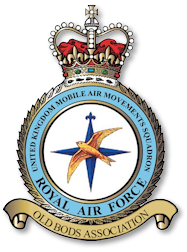
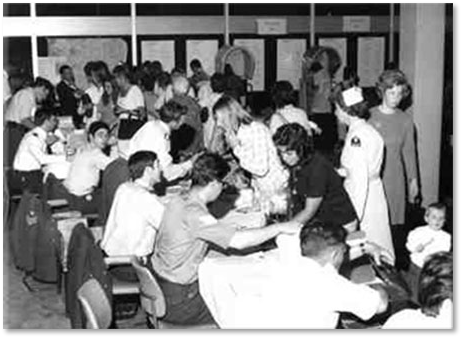
[The following comment comes from an unknown source: "The most crass example of bad decisions was during Operation Ablaut during the Turkish invasion of Cyprus in 1974. Every hercules loaded at Lyneham with a load for Dhekelia had to be unloaded at Akrotiri and backloaded to a 70 Sqn herc. This was because it was stated that only 70 Sqn crews had been trained to land at the short strip at Kingsfield. Even if this was true a plea that the crews should just take the Lyneham Hercs on the 10 minute flight to Dhekelia held no sway and for the duration everything was 'double handled'..."]
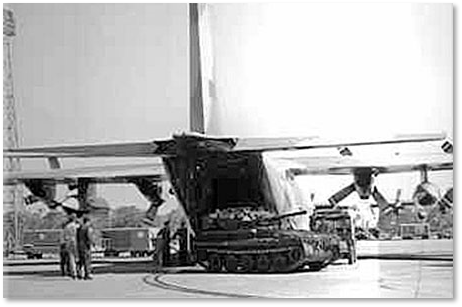
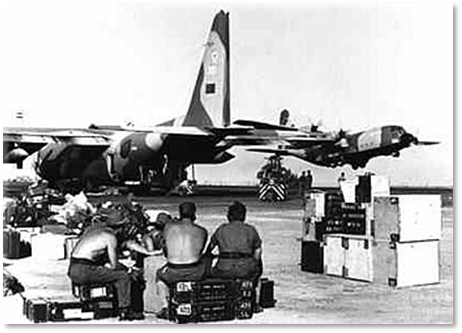
Still clad in working clobber (flying suits) we obviously hummed somewhat and the receptionist kept some distance between us. Determined to complete our mission before we were missed at the workplace, we asked if we could make a request and have it played for those near and dear at Akrotiri / Limassol. Our wish was granted and we were asked to leave our request on the desk.
Dave Cromb, who gave us the following pictures, remembers: "I was on the first wave in, courtesy of Ian Berry, who dragged me from slumber at about 2am, wouldn't have minded normally, but Phyl & I had been at a Lyneham Lanes party until about midnight."
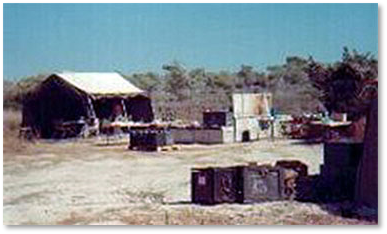
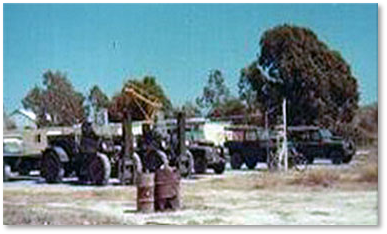
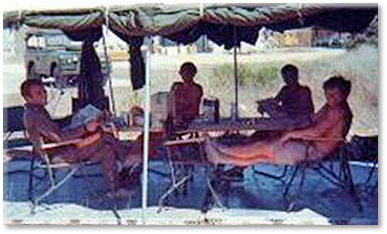
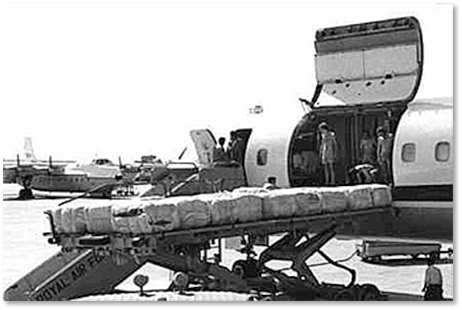
From: Ian Place, Meanwood, West Yorks
Sent: Friday, February 29, 2008 11:16
Subject: Ablaut
Tony,
It started one day after my 25th birthday - 20th July 1974. I and my team, Hotel team (the 'ugly bunch' as we were known) were wisked off to Akrotiri where 'surprise-surprise' panic had spread in like wildfire.
I remember holidaymakers in their flipflops walking off 70 Squadron Hercules and then having to reboard 24 Squadron Hercules parked on the other ramp. At the time we thought it was odd, but it was war so we assumed someone knew the greater plan.
Bristol Britannia's, which were heading down route to Changi, were turned around and sent back to Fairford (Brize was closed for re-surfacing at that time), but having to return to the ramp before take off as they did not have enough fuel!
Palletloads and flat floor loads of medical supplies flown in from all over - very hard work.
All over in 10 days during which all the landrovers ran out of fuel. We recovered on the 30th July to Fairford. Not much else can remember except that we were dry (no alcohol for 10 days) as no one had the time to go and get any
Ian
Sent: Friday, February 29, 2008 11:16
Subject: Ablaut
Tony,
It started one day after my 25th birthday - 20th July 1974. I and my team, Hotel team (the 'ugly bunch' as we were known) were wisked off to Akrotiri where 'surprise-surprise' panic had spread in like wildfire.
I remember holidaymakers in their flipflops walking off 70 Squadron Hercules and then having to reboard 24 Squadron Hercules parked on the other ramp. At the time we thought it was odd, but it was war so we assumed someone knew the greater plan.
Bristol Britannia's, which were heading down route to Changi, were turned around and sent back to Fairford (Brize was closed for re-surfacing at that time), but having to return to the ramp before take off as they did not have enough fuel!
Palletloads and flat floor loads of medical supplies flown in from all over - very hard work.
All over in 10 days during which all the landrovers ran out of fuel. We recovered on the 30th July to Fairford. Not much else can remember except that we were dry (no alcohol for 10 days) as no one had the time to go and get any
Ian
From: Keith Hubbard, Kilgetty, Pembroke
Sent: Friday, February 29, 2008 07:01
Subject: Ablaut
Hi Tony
I was at Akrotiri, on Station Movements (Air Cargo), at this time and as you correctly say, everything going on to Dhekelia was double handled.
Fortunately we had a detachment of Royal Marines with us also had a couple of American Navy guys, so manpower was not a problem.
Keith Hubbard
Sent: Friday, February 29, 2008 07:01
Subject: Ablaut
Hi Tony
I was at Akrotiri, on Station Movements (Air Cargo), at this time and as you correctly say, everything going on to Dhekelia was double handled.
Fortunately we had a detachment of Royal Marines with us also had a couple of American Navy guys, so manpower was not a problem.
Keith Hubbard

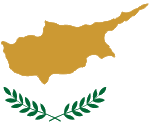
From: Tony Gale, Gatineau, QC
Sent: Friday, March 6, 2008 07:01
Subject: Ablaut
I recall the time I was working at MoD in Whitehall, in Movements Operations (RAF). It was during the Cyprus crisis of 1974 - we had been working for over 24 hours arranging the evacuation of British dependants when the Prime Minister (Harold Wilson) told us to double the size of the airlift! Anyway, earlier that morning, 2 or 3 o'clock, we had made the arrangements to make Archbishop Makarios "disappear" We had a helicopter bring him from Nicosia to Akrotiri where an Argosy was standing by to take him to Luqa - all the arrangements worked out just fine and he was summarily vanished, literally, into thin air.
At lunchtime that same day, I headed off to Garvey's, a favourite sandwich spot, and the newspaper boys on the corners were displaying headlines that read "Makarios Kidnapped! Whereabouts Unknown!" I had to bite my tongue - in my mind I was screaming "I know where he is!" heh heh heh.
We had a closed circuit television connection with all of the major Ops rooms throughout MoD, and several times a day we would tune in for "Prayers". The Prime Minister was on too - only in voice though, there was no image from Number 10.
It was hilarious sometimes, as the PM would ask a question of say, the Army Ops, and they would fumble and 'ummm ummm, well, let's see, I really think that comes under the Navy or RAF management blah blah blah' - just avoiding the whole thing because they did not have an immediate answer!
We would also get SitReps over the same system - showing the different lines of battle and explaining who was shooting who etc.. My boss, Squadron Leader John Wilkinson, had a villa on Cyprus, and so he would very carefully follow the daily reports, watching the front line creep towards his villa. One morning it had happened - his home away from home was well and truly located in enemy territory - he was devastated! About an hour later, there was a report over the system that a donkey was walking down the beach with what appeared to be a grand piano on its back. Squadron Leader Wilkinson screamed "That's my bloody piano!"
All of us in the Ops room just laughed so damn hard - we all had tears in our eyes! As a footnote, I never did find out if the report of the donkey was factual or just a set-up.
As an aside, it was in this office that I saw the very first fax machine - way back in the mid '70s. There was a cylinder affair, similar in size and appearance to Thos. Edison's first phonograph recording machine. The page to be transmitted was wrapped around the cylinder, and a manual telephone connection was made. As far as I recall, there was only one other machine - at Upavon. Once we had chatted to whomever on the other end, the receiver was placed into a modem cradle, the cylinder started to spin and transmission commenced. The actual time taken for one page was in excess of five minutes - accompanied by a lot of whirring noises. This was real cutting edge technology in those days.
Tony Gale
Sent: Friday, March 6, 2008 07:01
Subject: Ablaut
I recall the time I was working at MoD in Whitehall, in Movements Operations (RAF). It was during the Cyprus crisis of 1974 - we had been working for over 24 hours arranging the evacuation of British dependants when the Prime Minister (Harold Wilson) told us to double the size of the airlift! Anyway, earlier that morning, 2 or 3 o'clock, we had made the arrangements to make Archbishop Makarios "disappear" We had a helicopter bring him from Nicosia to Akrotiri where an Argosy was standing by to take him to Luqa - all the arrangements worked out just fine and he was summarily vanished, literally, into thin air.
At lunchtime that same day, I headed off to Garvey's, a favourite sandwich spot, and the newspaper boys on the corners were displaying headlines that read "Makarios Kidnapped! Whereabouts Unknown!" I had to bite my tongue - in my mind I was screaming "I know where he is!" heh heh heh.
We had a closed circuit television connection with all of the major Ops rooms throughout MoD, and several times a day we would tune in for "Prayers". The Prime Minister was on too - only in voice though, there was no image from Number 10.
It was hilarious sometimes, as the PM would ask a question of say, the Army Ops, and they would fumble and 'ummm ummm, well, let's see, I really think that comes under the Navy or RAF management blah blah blah' - just avoiding the whole thing because they did not have an immediate answer!
We would also get SitReps over the same system - showing the different lines of battle and explaining who was shooting who etc.. My boss, Squadron Leader John Wilkinson, had a villa on Cyprus, and so he would very carefully follow the daily reports, watching the front line creep towards his villa. One morning it had happened - his home away from home was well and truly located in enemy territory - he was devastated! About an hour later, there was a report over the system that a donkey was walking down the beach with what appeared to be a grand piano on its back. Squadron Leader Wilkinson screamed "That's my bloody piano!"
All of us in the Ops room just laughed so damn hard - we all had tears in our eyes! As a footnote, I never did find out if the report of the donkey was factual or just a set-up.
As an aside, it was in this office that I saw the very first fax machine - way back in the mid '70s. There was a cylinder affair, similar in size and appearance to Thos. Edison's first phonograph recording machine. The page to be transmitted was wrapped around the cylinder, and a manual telephone connection was made. As far as I recall, there was only one other machine - at Upavon. Once we had chatted to whomever on the other end, the receiver was placed into a modem cradle, the cylinder started to spin and transmission commenced. The actual time taken for one page was in excess of five minutes - accompanied by a lot of whirring noises. This was real cutting edge technology in those days.
Tony Gale





